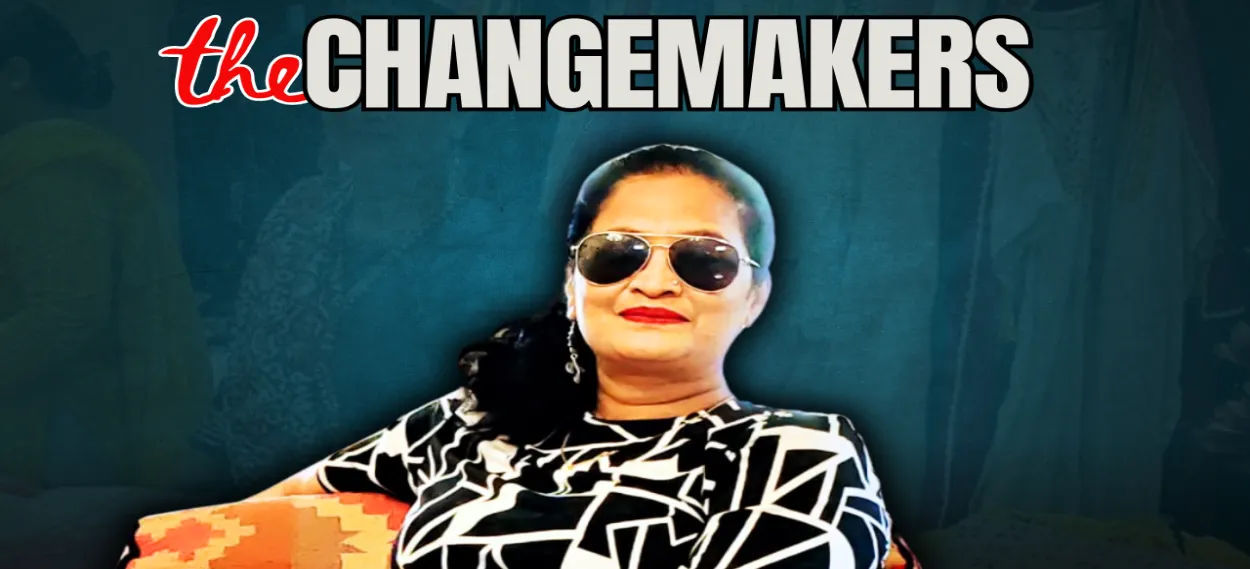
Onika Maheshwari/ New Delhi
In a quiet lane of Aligarh, Rubina Rashid Ali’s home tells a story that spans centuries. Rooted in the legacy of Mughal aesthetics, it’s more than a house—it’s a living canvas.
Here, Rubina is reviving a traditional art form, not just as a personal calling but as a movement that empowers thousands of women.
Phool-patti—floral appliqué embroidery—is delicate in both name and technique. For generations, the women of Aligarh and Rampur have woven poetry from fabric and thread, crafting intricate petals and leaves with practiced precision. Yet, their artistry was often exploited, their names lost behind middlemen and market dynamics.
.jpeg) Phool-Patti Work
Phool-Patti Work
“I saw how the system was built to overlook them,” Rubina says. “The women created beauty, but the credit—and the profit—went elsewhere.”
Born into an academic family in Aligarh, Rubina grew up surrounded by books and tradition. Her mother ran the household, while her father nurtured intellectual pursuits. But her own spark came from watching neighborhood women embroider wedding outfits—an unspoken heritage passed from hand to hand. She absorbed the rhythm, the language of threads, and quietly began sketching her own designs.
.png) Rubina Rashid Ali at an exhibition of clothes made with appliqué work
Rubina Rashid Ali at an exhibition of clothes made with appliqué work
Phool-patti is not mere ornamentation. It involves cutting, folding, and stitching small pieces of fabric into floral motifs before embroidering them onto textiles. Its charm lies in its subtlety, its roots deep in regional history—yet it remained at the edges of India’s fashion consciousness.
In 2003, Rubina felt a strong pull toward the craft, but life’s responsibilities—studies, work, marriage, and motherhood—kept it at bay. Then, one morning in 2019, after sending her children off to school, she opened a drawer and found her old sketches—fragile outlines of petals and patterns. Holding them again, she felt something awaken. She picked up where she’d left off—and never looked back.
_(1).jpeg) Rubina Rashid Ali
Rubina Rashid Ali
Rubina works in the administrative department at Aligarh Muslim University and holds a Master’s degree in Advertising and Communication from the National Institute of Advertising, Delhi. This dual identity—artist and communicator—enabled her to present phool-patti not just as craft, but as a brand, a movement, a message.
She brought together a team of women—artisans who had practiced phool-patti for years without recognition. Through social media, she began showcasing their work under the label Bend the Trend With Phoolpatti. Orders came in from across the country. A forgotten form found a new voice.
Awaz the Voice made a detailed video of the Rubina Rashid Ali's work.
Rubina is also reimagining the form itself. She blends phool-patti with crochet, tie-and-dye, mukesh, chikankari, and gota-patti, creating hybrids that feel both rooted and relevant. Her work spans fabrics like Chanderi silk and Kota cotton and branches into home décor and gifting. What was once viewed as an old-world embellishment is now a statement of cultural resilience.
.webp) AI-generated picture of 'phool-patti' work.
AI-generated picture of 'phool-patti' work.
Her creations have been exhibited at Delhi Haat, Kolkata Bazaar, and across cities like Bengaluru, Kota, and Jaipur. At each event, people weren’t just buying embroidery—they were connecting with the stories behind each stitch. “Earlier, we worked for others who took the credit,” says one artisan. “Now, our work is our identity.”
This recognition is just one layer of Rubina’s mission. She contributed to Phool-Patti ka Kaam, the first book dedicated to this art form. It documents work from the 1970s–80s by researcher Saleha Khan and serves as a vital resource for policymakers, designers, and scholars. The aim is not only to archive the art but to shift its future—ensuring artisans receive visibility, fair pay, and long-term support.
Beyond embroidery, Rubina’s vision extends to holistic empowerment. She is building plans to support artisans' children with education and healthcare initiatives. Each woman she mentors becomes part of a larger circle of social transformation.
.jpeg) Entrepreneur Rubina Rashid Ali
Entrepreneur Rubina Rashid Ali
In a world flooded with machine-made fashion, people are still drawn to the intimacy of handmade pieces. Phool-patti work offers that quiet authenticity—beauty crafted by hands, guided by tradition, and infused with meaning.
“I don’t believe crafts should remain confined to the past,” Rubina says. “It’s time we bring them to global platforms—without losing their soul.”
She is now advocating for the inclusion of phool-patti in school syllabi and fashion institute curricula. Her dream is for every young girl who learns the craft to see herself not just as a needleworker, but as an artist. In places like Rampur, where this work thrives, she sees potential not only for revival—but for reinvention.
From the narrow lanes of Aligarh, phool-patti has crossed borders. Every petal carries more than thread—it carries a voice, a dream, and the dignity of craft.
READ MORE: Mohammad Luqman Ali: A role model of youth got inspiration from his father
Rubina Rashid Ali is the face of that transformation: bold, silent, powerful. She reminds us that real change doesn’t always shout. Sometimes, it whispers through a needle and thread:
“Let our art be known by our names—and let our names change the story of our society.”
